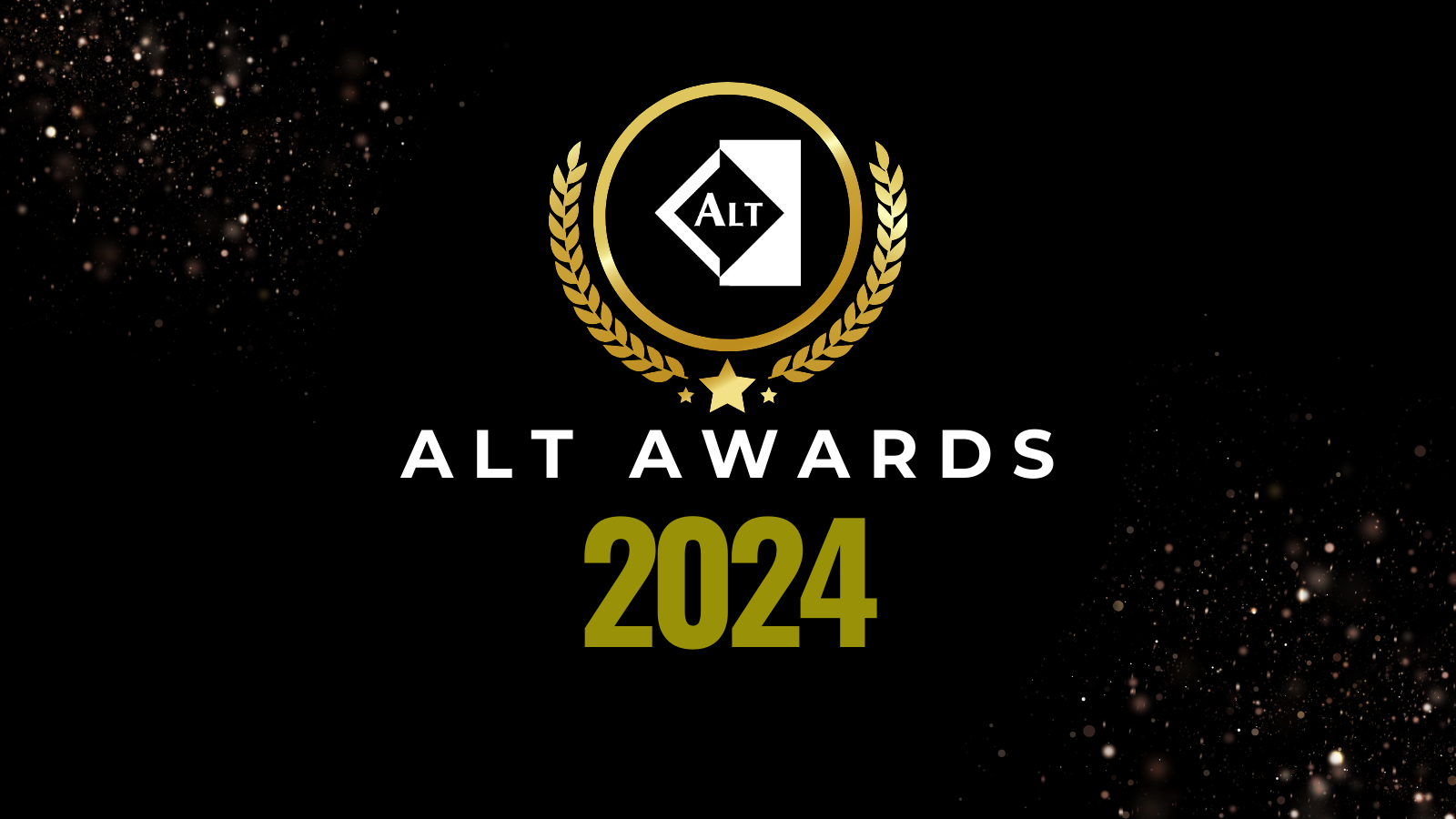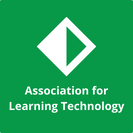
Meet the Winners of the ALT Awards 2024
This year’s Awards Ceremony, held at the ALT Annual Conference in Manchester on Wednesday, 4 September 2024, was particularly special. We were delighted to announce the launch of a brand new award, in partnership with Ufi VocTech Trust, which focuses on vocational education. Additionally, we reinstated the Community Choice Award, much to the delight of our community.
ALT Award for Individuals
Winner: Laura Milne
Since I joined the University of Chester, I have been part of some exciting and transformative work we are doing to improve digital education. I have prioritised building relationships across the university and the broader sector, aiming to bring a big injection of enthusiasm and expertise for sound learning design, good digital education practice and creating a sense of community around effective technology-enhanced learning.
A major focus for me is how we use our VLE (Moodle). The Digital Education team I lead undertook a templating project to improve the uptake of our Moodle Baseline; between 67 and 100% of modules across the university have improved consistency compared to previous years, which has been reflected positively in student feedback. I am now leading on an ambitious upgrade of our VLE, undertaken as a two-year strategic project to improve functionality, accessibility and the user interface, to meet our institution’s growing needs, and to incorporate student and staff co-design.
I have worked on our university’s response to Generative AI through our AI and Education working group and I co-authored an article with Professor Jackie Potter and Dr Katharine Welsh reflecting on our change management approach. I have run our institutional pilot of Teachermatic, and co-ordinated our project team for our work on the Jisc Digital Transformation pilot. I managed and supported our students-as-partners content developers on a funded project on the Scholarship of Teaching and Learning. I have also collaborated to launch the Education Technology Forum to lead on our EdTech strategy and vision.
I am honoured to be recognised with this award.
ALT Award for Institutions and Teams
Winner: MTU Technology Enhanced Learning Team
The Technology Enhanced Learning (TEL) team at Munster Technological University (MTU) has driven significant advancements and change in digital learning through a series of strategic initiatives this year.
Our Reusable Learning Resources (RLR) project has led to the creation of a diverse suite of media-rich, Open Educational Resources (OERs), a collaborative process which has not only enriched curricula but has also enhanced awareness of Open Education Practices (OEP) across the university. Hosting the international ALT OER24 conference in March provided us with further opportunities to showcase such work and to exchange knowledge and collaborate with others.
Our commitment to enhancing accessibility and equity has driven a number of developments, including the integration of new accessibility tools into our digital infrastructure. This added technical capacity, together with other supports and training, has empowered staff to identify and address accessibility issues in their courses, ensuring a more inclusive experience for all students.
The “TEL me More” initiative has also continued to support staff through personalised digital mentoring, promoting innovative teaching practices and widespread digital transformation.
Ongoing meetings of a special community of practice for staff teaching online has provided a further context for colleagues to share their experiences and learning and to contribute to the ongoing evolution of our systems of online and blended learning.
Department head, Gearóid Ó Súilleabháin emphasises, “These and other developments are at the core of our vision and values, providing evidence-based services and solutions, creating new learning opportunities, and enriching the learning experience of all our students.”
ALT Award for Leadership in Digital Education
Winner: Richard Walker
I have over 25 years of experience working with learning technology, having previously supported hybrid learning innovations at Nyenrode Business University in the Netherlands before moving to the University of York in 2003 to provide leadership for educational technology services. This has involved establishing a central learning technology team in 2005 and then rolling out a range of services from VLE, lecture recording and polling platforms to an institutional VLE exam service to help support active and inclusive learning outcomes for our students.
As a strategic leader I present a vision and the evidence for technology developments to be undertaken in support of institutional objectives and then facilitate the implementation process by guiding and empowering others, as part of a distributed leadership approach. This is reflected in my work as Chair of the E-Accessibility Working Group, where I have coordinated the contributions of professional services, academics and student representatives to raise the profile of digital accessibility as a strategic priority. This has led to the rollout of a mandatory digital accessibility awareness tutorial for all staff to complete, and to the incorporation of digital responsibilities within the University’s EDI strategic objectives, committing the institution to developing inclusive systems and infrastructure for both digital and campus spaces.
As a digital leader I apply FELT and CMALT principles in my day-to-day practice and encourage the teams I manage to follow a similar approach. A commitment to fair and equitable access for all sits at the heart of our digital practice at York
Highly commended: University of Nottingham Digital Learning Directors
The challenge of engaging with digital learning can leave universities feeling “at sea.” The bold decision to appoint and empower a team of senior academics to lead the digital transformation of teaching and learning at the University of Nottingham, did indeed place us in the ocean, about 400 miles to the North East of New Zealand! Because, just as three words can now be used to pinpoint geographical locations, three words can sum up the impact of our team. These are Culture, Collaboration and Curriculum. As digital technology represents a significant capital expenditure for universities, teaching practice can become eclipsed by the digital infrastructure decision-making. As Digital Learning Directors (DLD), we place the emphasis firmly back on curriculum, pedagogy, students and learning, foreshadowing the Office for Students Blended Learning Report (2022). Collaboration is central to the team’s success. As senior academics, we inhabit a unique position between faculty and professional services leaders, and teachers and students. We are skilled third-space professionals. This enables us to truly co-create digital learning solutions, coordinating the many stakeholder-teams with roles in this area. Finally, as teachers, we direct the emphasis away from software and hardware solutions towards fostering the culture needed for excellent digital learning to thrive.
ALT Award for Digital Transformation
(in partnership with Jisc)
Winner: The Đigi:Đổi Consortium (An international group led by Liverpool John Moores University in the UK and Phu Xhuan University in Vietnam)
The Digi-Doi consortium aims to create a future-proofed, scalable digital transformation hub in Vietnam underpinned by digital inclusion, wellbeing, and net-zero.
Our ambition is to address issues and challenges of Digital Transformation in Higher education in Vietnam through:
SUPPORT for strategic and policy implementation
STAFF DEVELOPMENT opportunities
UTILISATION of existing platforms for collaboration
ENGAGEMENT to understand needs and promote digital experimentation
and through ADAPTING tried-and-tested toolkits
Our aims are to create a Viet Nam - contextualised:
(1) national-level framework and roadmap for change
(2) project-based training, underpinned by student partnerships augmented by reciprocal mentoring for deeper behaviour change, and
(3) to develop a policy brief, case study and dialogue to extend national and UK/ASEAN partnerships.
In our activities, to date we have involved:
>200 Vietnamese higher education leaders at different levels and across professional services
>300 Vietnamese lecturers/researchers, and
>10,000 Vietnamese learners
The Digi Doi Consortium has inspired over 300 projects through its strategic driver is to develop digital transformation capability and innovation across Vietnam. The programme has three connected elements which support each other:
- Workshops – for introducing key ideas and practices and building confidence through networks
- project-based learning assignments – to deepen experiences of implementing digital transformation
- and group mentoring – to support experiences of implementing digital transformation and build longer term confidence.
We will have opportunities for projects and achievements to be celebrated out our hybrid showcase event in October 2024.
Highly Commended: Hull College
ALT Award for Case Studies of Ethical EdTech
Winner: MSc Disability Studies, Rights and Inclusion at the University of Leeds
The programme development team for the fully online MSc Disability Studies, Rights and Inclusion at the University of Leeds comprises academic colleagues in the Centre for Disability Studies, School of Sociology and Social Policy and online education specialists in the Digital Education Service. Our work demonstrates design-led inclusive education and a human-centred approach to digital accessibility for disabled students.
Universal Design for Learning (UDL) provided the framework for design, through authentic case study options and choice of assessment, realistic activities and voices of disabled people, and objectives that align with student learning needs and professional practice. Online materials, including instructional and case study videos, podcasts and inclusive imagery, are provided with accessible alternatives.
We worked in partnership with an external disability testing agency, Web Usability, to complement in-house learning technologists’ expertise in digital accessibility. This provided rich and authentic feedback through disabled users’ experiences of our learning platforms, courses materials and instructional design at the very beginning of our programme development process.The testing highlighted our effective practices and also raised challenges of navigation, layout and platform interface which we were able to address.
The collaboration, values-led approach to inclusive programme design and commitment to go beyond standards and truly understand the human experience of our courses through the lens of disabled users sets this programme development apart. Our approach has created a programme that models exceptional educational practice, successfully supporting students with a range of learning intentions and contexts, with lasting benefits for online education at Leeds and beyond.
ALT Award for Use of Technology in Vocational Education
(in partnership with Ufi VocTech Trust)
Winner: Burton & South Derbyshire College
Our entry highlights the innovative integration of the Crdl device into the Health and Social Care Level 2 and 3 vocational qualifications at Burton and South Derbyshire College. The Crdl, an interactive technology that generates soundscapes through touch, has significantly transformed our approach to educating learners about dementia care outside a clinical setting.
We have utilised the Crdl in two impactful ways. Firstly, in role-play scenarios, it allows learners to simulate dementia care environments, adopting empathy and understanding of the sensory challenges faced by individuals with dementia. Secondly, we have facilitated direct engagement between learners and local residents with dementia through therapeutic workshops. This not only enriches the learning experience with real-world applications but also provides meaningful interactions for the community.
Our innovative approach demonstrates a commitment to enhancing vocational education by integrating technology that educates, empathises, and engages. The Crdl enhances learners' competence and confidence in managing complex care scenarios, emphasising the human element in healthcare through a digital sensory tool. This initiative has also strengthened community ties and set a replicable model for other institutions aiming to combine technology with practical healthcare training.
By showcasing the Crdl's potential, we highlight our dedication to innovative and effective educational practices, promoting ethical and empathetic use of technology in learning environments. This project ensures the technology to enhance learner dignity and well-being while adopting communication skills and practical, hands-on experience essential for vocational training.
ALT Community Choice Award
Winner: Puiyin Wong
The ALT Community Choice Award was brought back for 2024, after a few years away. The award allows our Member community to vote for their winning entry amongst all of the categories. We had a huge volume of votes, and we are delighted to announce Puiyin Wong as the winner. Puiyin’s entry showed her dedication to Technology-Enhanced Learning research and practice, displaying an incredible community of practice for sharing best practices and ideas around the use of learning technologies. The impact of her work was demonstrated within her own organisation, community, and wider educational landscape.
